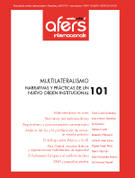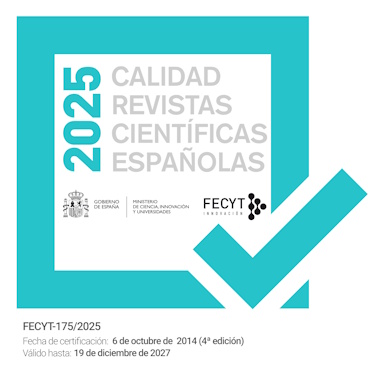NGOs and small states in the establishing and consolidation of the ICC
Keywords:
ICC, NGO, small states, AndorraAbstract
Revista CIDOB d’Afers Internacionals, nº 101
Quadrimestral (april 2013)
ISSN:1133-6595 | E-ISSN:2013-035X
Both NGOs and small states were vital for the establishing and consolidation of the International Criminal Court (ICC), and their joint efforts brought much more success than they could have obtained working separately. The case of Andorra illustrates how the interests of small democratic states that are members of the Group of Like-Minded States agreed with those of the NGO Coalition to promote an International Criminal Court and how, through the sovereign capacity of the small states and the experiences of the NGOs, several successful models emerged in the framework of the Rome Conference to draft and adopt the ICC Statute. The shortcomings with respect to responsibility of the NGOs that wish to represent international civil society can be overcome by cooperation with small states that share the same objectives.
>> The full text articles of this issue are available only in Spanish language
References
Ahmed, Shamina y Potter, David M. NGOs in International Politics. Sterling, VA: Kumarian Press, 2006.
Bann, Amy Jeanne. The Non-Governmental Organization Coalition for an International Criminal Court: A Case Study on NGO Networking. Blacksburg: Virginia Polytechnic Institute and State University, 2000.
Coalition for the International Criminal Court, CICC. Press Release: «Halfway point reached». Nueva York, 30 de abril de 2001.
Dahl, Robert. A. y Tufte Edward. R. Size and Democracy. Stanford: Stanford University Press, 1973.
De Frouville, Olivier. Droit International Pénal - Sources, Incriminations, Responsabilité. París: Éditions A. Pédone, 2012.
Dixon, Catherine; Herlemont-Zoritchak, Nathalie; Boivin, Jean-Marc (Handicap International) (eds.). Gatecrashers, controversial organizations, what future for NGOs in the new global governance. París: Institut de Relations Internationales et Stratégiques/Dalloz, 2008.
Dupuy, Pierre-Marie. «Le concept de la société civile internationale, identification et génèse», en : Gherari, Habib y Szurek, Sandra.
L’émergence de la société civile internationale - Vers la privatization du droit international? París: Editions Pédone, 2003.
Durham, Helen. Increasing the Effectiveness of the International Criminal Court: the Contribution of Non-State Actors. Melbourne: Dissertation/Thesis, 2005. Chapter facilitated by the Coalition for the International Criminal Court. Nueva York, 23.03.2012.
Gherari, Habib y Szurek, Sandra. L’émergence de la société civile internationale - Vers la privatization du droit international? París: Editions Pédone, 2003.
Hong, Mark. «Small States in the United Nations». International Social Science Journal, vol. 47, n.º 2 (junio 1995), p. 277-287.
Keohane, Robert. «Lilliputians’ Dilemmas: Small States in International Politics». International Organization, vol. 23, n.º 2 (1969), p. 291-296.
Kuzmarov, Betina. «An Uneasy Synergy: The Relationship Between Non-Governmental Organizations and the Criminal Court». Windsor Review of Legal and Social Issues, n.º 11 (2001), p. 7-39.
Maass, Matthias. «The Elusive Definition of the Small State». International Politics, vol. 46, n.º 1 (2009), p. 65-83.
Martens, Kerstin. «Examining the (Non-)Status of NGOs in International Law». Indiana Journal of Global Legal Studies, vol. 10, n.º 2 (verano 2003), p. 1-24.
Pace, William R. «ICC Treaty Passes Half-Way Mark: Croatia, Paraguay and Andorra Bring Ratifications up to 32». The International Criminal Court Monitor, n.º 17 (mayo 2001).
Pace, William R. y Schense, Jennifer. «The Role of NGOs», en: Cassese, Antonio; Gaeta, Paola; Jones, John R.W.D. The Rome Statute of the International Criminal Court. Oxford: Oxford University Press, 2002 (in chapter provided by William Pace 03.23.2012).
Pearson, Zoe. «Non-Governmental Organizations and the International Criminal Court: Changing Landscapes of International Law». Cornell International Law Journal, n.º 39 (2006), p. 243-84.
Rapaport, Jacques; Muteba, Ernest; Therattil, Joseph J. Small States & Territories – Statuts and Problems. Nueva York: Arno Press, 1971.
Risse-Kappen, Thomas (ed.). Bringing Transnational Relations Back In: Non-State Actors, Domestic Structures and International Institutions. Cambridge: Cambridge University Press, 1996.
Real Instituto de Estudios Europeos. Qué futuro para la Organización de las Naciones Unidas? Andorra la Vella: CRAE/Real Instituto de Estudios Europeos, 2003.
Sadat, Leila Nadya. «The International Criminal Court Treaty Enters Into Force». ASIL Insights (abril 2002). American Society of International Law. Washington DC.
Slade, Tuiloma Neroni y Clark Roger S. «Preamble and Final Clauses», en: Lee Roy S. (ed.). The International Criminal Court: The Making of the Rome Statute. The Hague: Kluwer Law International, 1999.
Smouts, Marie-Claude. «La société civile est une construction intellectuelle qui sert un projet politique», en: Gherari, Habib y Szurek, Sandra. L’émergence de la société civile internationale - Vers la privatization du droit international? París: Editions Pédone, 2003.
Swedish Presidency. «Declaration of the European Union on the Ratification by Andorra of the Rome Statute of the International Criminal Court». Press Statement (10 de mayo de 2001). Bruselas.
Szurek, Sandra. «La société civile internationale et l’élaboration du droit international», en : Gherari, Habib y Szurek, Sandra. L’émergence de la société civile internationale - Vers la privatization du droit international? París: Editions Pédone, 2003.
Thomas, Daniel C. «International NGOs, State Sovereignty, and Democratic Values». Chicago Journal of International Law, vol. 2, n.º 2 (Fall 2001), p. 389-95.
Törnquist-Chesnier, Marie. «How the International Criminal Court Came to Life: The Role of Non-Governmental Organizations». Global Society, vol. 21, n.º 3 (julio 2007), p. 449-65.
United Nations/Naciones Unidas - Convención para la Prevención y la Sanción del Delito de Genocidio, artículo 6 en: http://www2.ohchr.org/spanish/law/genocidio.htm [Fecha de consulta 19.03.2013].
United Nations. Official Records, Volume II. «Summary Records of the Plenary Meetings and of the meetings of the Committee of the Whole». United Nations Diplomatic Conference of Plenipotentiaries on the Establishment of an International Criminal Court Rome, 15 June - 17 July 1998 A/CONF.183/13 (Vol.II). Nueva York: United Nations, 2002.
United Nations. Official Records, Volume III. «Reports and Other Documents». United Nations Diplomatic Conference of Plenipotentiaries on the Establishment of an International Criminal Court Rome, 15 June - 17 July 1998. A/CONF.183/13 (Vol. III). Nueva York: United Nations, 2002.
United Nations. Official Records, Volume III. «Reports and Other Documents». United Nations. Document A/CONF.183/C.1/L.32 «Andorra: proposal regarding the Preamble», in United Nations Diplomatic Conference of Plenipotentiaries on the Establishment of an International Criminal Court Rome, 15 junio-17 julio de 1998. A/CONF.183/13 (Vol. III). Nueva York: United Nations, 2002.
Welch, Claude E., Jr. y Watkins, Ashley F. «Extending Enforcement: The Coalition for the International Criminal Court». Human Rights Quarterly, vol. 33, n.º 4 (noviembre 2011), p. 927-1.031.













